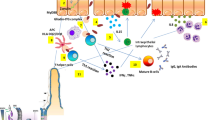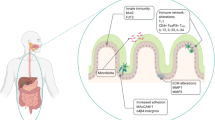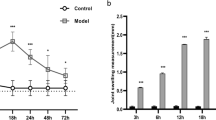Abstract
Aims
Proprotein convertase subtilisin/kexin type 9 (PCSK9) modulates CD4+ T cell differentiation and inflammatory response, the latter ones mediate ulcerative colitis (UC) initiation. This study intended to explore the correlation of serum PCSK9 with disease activity, T helper (h)1/Th2/Th17 cells, and clinical response of tumor necrosis factor inhibitor (TNFi) in UC patients.
Methods
In 65 UC patients underwent TNFi treatment, serum PCSK9 was evaluated at baseline (W0), week (W)2, W6, and W12 by enzyme-linked immunosorbent assays; meanwhile, Th1/Th2/Th17 cells were determined at W0 by flow cytometry. Besides, serum PCSK9 was detected in 65 healthy controls (HCs).
Results
Serum PCSK9 was increased in UC patients compared to HCs (P<0.001), which also positively correlated with C-reactive protein (P=0.009), total Mayo score (P=0.018), Mayo-defined disease activity (P=0.020), Th1 (P=0.033), and Th17 (P=0.003) cells, but not Th2 cells (P=0.086) in UC patients. Interestingly, serum PCSK9 was steadily declined from W0 to W12 (P<0.001). W2-W0, W6-W0, and W12-W0 serum PCSK9 change (PCSK9 at W2, W6, or W12 minus PCSK9 at W0, respectively) was gradually becoming greater during TNFi treatment (P<0.001). Furthermore, forty-five (69.2%) patients achieved clinical response at W12, whose serum PCSK9 at W6 (P=0.041) and W12 (P=0.001) was lower, and W6-W0 (P=0.043), W12-W0 (P=0.019) serum PCSK9 change was more obvious compared to patients without clinical response at W12.
Conclusions
Serum PCSK9 is positively related to disease activity, Th1, and Th17 cells in UC patients; further, its decline correlates with TNFi response achievement in these patients.





Similar content being viewed by others
Data availability
The data utilized in this study are included in the article.
References
Kobayashi T, Siegmund B, Le Berre C et al (2020) Ulcerative colitis. Nat Rev Dis Primers 6:74. https://doi.org/10.1038/s41572-020-0205-x
Conrad K, Roggenbuck D, Laass MW (2014) Diagnosis and classification of ulcerative colitis. Autoimmun Rev 13:463–466. https://doi.org/10.1016/j.autrev.2014.01.028
Segal JP, LeBlanc JF, Hart AL (2021) Ulcerative colitis: an update. Clin Med (Lond) 21:135–139. https://doi.org/10.7861/clinmed.2021-0080
Du L, Ha C (2020) Epidemiology and Pathogenesis of Ulcerative Colitis. Gastroenterol Clin North Am 49:643–654. https://doi.org/10.1016/j.gtc.2020.07.005
Macaluso FS, Orlando A, Papi C et al (2022) Use of biologics and small molecule drugs for the management of moderate to severe ulcerative colitis: IG-IBD clinical guidelines based on the GRADE methodology. Dig Liver Dis 54:440–451. https://doi.org/10.1016/j.dld.2022.01.127
Feuerstein JD, Isaacs KL, Schneider Y et al (2020) AGA Clinical Practice Guidelines on the Management of Moderate to Severe Ulcerative Colitis. Gastroenterology 158:1450–1461. https://doi.org/10.1053/j.gastro.2020.01.006
Bhattacharya A, Osterman MT (2020) Biologic Therapy for Ulcerative Colitis. Gastroenterol Clin North Am 49:717–729. https://doi.org/10.1016/j.gtc.2020.08.002
Rubin DT, Ananthakrishnan AN, Siegel CA et al (2019) ACG Clinical Guideline: Ulcerative Colitis in Adults. Am J Gastroenterol 114:384–413. https://doi.org/10.14309/ajg.0000000000000152
Xiao Q, Li X, Li Y et al (2021) Biological drug and drug delivery-mediated immunotherapy. Acta Pharm Sin B 11:941–960. https://doi.org/10.1016/j.apsb.2020.12.018
Roda G, Jharap B, Neeraj N et al (2016) Loss of Response to Anti-TNFs: Definition, Epidemiology, and Management. Clin Transl Gastroenterol 7:e135. https://doi.org/10.1038/ctg.2015.63
Singh S, George J, Boland BS et al (2018) Primary Non-Response to Tumor Necrosis Factor Antagonists is Associated with Inferior Response to Second-line Biologics in Patients with Inflammatory Bowel Diseases: A Systematic Review and Meta-analysis. J Crohns Colitis 12:635–643. https://doi.org/10.1093/ecco-jcc/jjy004
Chen X, Hou J, Yuan Y et al (2016) Adalimumab for Moderately to Severely Active Ulcerative Colitis: A Systematic Review and Meta-Analysis. BioDrugs 30:207–217. https://doi.org/10.1007/s40259-016-0173-6
Pugliese D, Felice C, Papa A et al (2017) Anti TNF-alpha therapy for ulcerative colitis: current status and prospects for the future. Expert Rev Clin Immunol 13:223–233. https://doi.org/10.1080/1744666X.2017.1243468
Schulz R, Schluter KD, Laufs U (2015) Molecular and cellular function of the proprotein convertase subtilisin/kexin type 9 (PCSK9). Basic Res Cardiol 110:4. https://doi.org/10.1007/s00395-015-0463-z
Mousavi SA, Berge KE, Leren TP (2009) The unique role of proprotein convertase subtilisin/kexin 9 in cholesterol homeostasis. J Intern Med 266:507–519. https://doi.org/10.1111/j.1365-2796.2009.02167.x
Wu NQ, Shi HW, Li JJ (2022) Proprotein Convertase Subtilisin/Kexin Type 9 and Inflammation: An Updated Review. Front Cardiovasc Med 9:763516. https://doi.org/10.3389/fcvm.2022.763516
Tang ZH, Peng J, Ren Z et al (2017) New role of PCSK9 in atherosclerotic inflammation promotion involving the TLR4/NF-kappaB pathway. Atherosclerosis 262:113–122. https://doi.org/10.1016/j.atherosclerosis.2017.04.023
Kim YU, Kee P, Danila D et al (2019) A Critical Role of PCSK9 in Mediating IL-17-Producing T Cell Responses in Hyperlipidemia. Immune Netw 19:e41. https://doi.org/10.4110/in.2019.19.e41
Yao D, Dong M, Dai C et al (2019) Inflammation and Inflammatory Cytokine Contribute to the Initiation and Development of Ulcerative Colitis and Its Associated Cancer. Inflamm Bowel Dis 25:1595–1602. https://doi.org/10.1093/ibd/izz149
Fang C, Luo T, Lin L (2018) Elevation of serum proprotein convertase subtilisin/kexin type 9 (PCSK9) concentrations and its possible atherogenic role in patients with systemic lupus erythematosus. Ann Transl Med 6:452. https://doi.org/10.21037/atm.2018.11.04
Cai J, Jiang Y, Chen F et al (2022) Serum PCSK9 is positively correlated with disease activity and Th17 cells, while its short-term decline during treatment reflects desirable outcomes in ankylosing spondylitis patients. Ir J Med Sci. https://doi.org/10.1007/s11845-022-03204-6
Frostegard J, Ahmed S, Hafstrom I et al (2021) Low levels of PCSK9 are associated with remission in patients with rheumatoid arthritis treated with anti-TNF-alpha: potential underlying mechanisms. Arthritis Res Ther 23:32. https://doi.org/10.1186/s13075-020-02386-7
Marinelli C, Zingone F, Lupo MG et al (2022) Serum Levels of PCSK9 Are Increased in Patients With Active Ulcerative Colitis Representing a Potential Biomarker of Disease Activity: A Cross-sectional Study. J Clin Gastroenterol 56:787–793. https://doi.org/10.1097/MCG.0000000000001607
Schroeder KW, Tremaine WJ, Ilstrup DM (1987) Coated oral 5-aminosalicylic acid therapy for mildly to moderately active ulcerative colitis. A randomized study. N Engl J Med 317:1625–1629. https://doi.org/10.1056/NEJM198712243172603
Rutgeerts P, Sandborn WJ, Feagan BG et al (2005) Infliximab for induction and maintenance therapy for ulcerative colitis. N Engl J Med 353:2462–2476. https://doi.org/10.1056/NEJMoa050516
Bae JM, Choo JY, Kim KJ et al (2017) Association of inflammatory bowel disease with ankylosing spondylitis and rheumatoid arthritis: A nationwide population-based study. Mod Rheumatol 27:435–440. https://doi.org/10.1080/14397595.2016.1211229
Xu Q, Ni JJ, Han BX et al (2021) Causal Relationship Between Gut Microbiota and Autoimmune Diseases: A Two-Sample Mendelian Randomization Study. Front Immunol 12:746998. https://doi.org/10.3389/fimmu.2021.746998
Zhou R, Chang Y, Liu J et al (2017) JNK Pathway-Associated Phosphatase/DUSP22 Suppresses CD4(+) T-Cell Activation and Th1/Th17-Cell Differentiation and Negatively Correlates with Clinical Activity in Inflammatory Bowel Disease. Front Immunol 8:781. https://doi.org/10.3389/fimmu.2017.00781
Caporali R, Bugatti S, Cavagna L et al (2014) Modulating the co-stimulatory signal for T cell activation in rheumatoid arthritis: could it be the first step of the treatment? Autoimmun Rev 13:49–53. https://doi.org/10.1016/j.autrev.2013.06.008
Mauro D, Thomas R, Guggino G et al (2021) Ankylosing spondylitis: an autoimmune or autoinflammatory disease? Nat Rev Rheumatol 17:387–404. https://doi.org/10.1038/s41584-021-00625-y
Sharabi A, Tsokos GC (2020) T cell metabolism: new insights in systemic lupus erythematosus pathogenesis and therapy. Nat Rev Rheumatol 16:100–112. https://doi.org/10.1038/s41584-019-0356-x
Meng Y, Zheng X, Zhang Z et al (2023) Circulating PCSK9 relates to aggravated disease activity, Th17/Treg imbalance, and predicts treatment outcome of conventional synthetic DMARDs in rheumatoid arthritis patients. Ir J Med Sci. https://doi.org/10.1007/s11845-023-03323-8
Lei L, Li X, Yuan YJ et al (2020) Inhibition of proprotein convertase subtilisin/kexin type 9 attenuates 2,4,6-trinitrobenzenesulfonic acid-induced colitis via repressing toll-like receptor 4/nuclear factor-kappa B. Kaohsiung J Med Sci 36:705–711. https://doi.org/10.1002/kjm2.12225
Frank DN, St Amand AL, Feldman RA et al (2007) Molecular-phylogenetic characterization of microbial community imbalances in human inflammatory bowel diseases. Proc Natl Acad Sci U S A 104:13780–13785. https://doi.org/10.1073/pnas.0706625104
Shi N, Li N, Duan X et al (2017) Interaction between the gut microbiome and mucosal immune system. Mil Med Res 4:14. https://doi.org/10.1186/s40779-017-0122-9
Morelli MB, Wang X, Santulli G (2019) Functional role of gut microbiota and PCSK9 in the pathogenesis of diabetes mellitus and cardiovascular disease. Atherosclerosis 289:176–178. https://doi.org/10.1016/j.atherosclerosis.2019.07.023
Miao J, Manthena PV, Haas ME et al (2015) Role of Insulin in the Regulation of Proprotein Convertase Subtilisin/Kexin Type 9. Arterioscler Thromb Vasc Biol 35:1589–1596. https://doi.org/10.1161/ATVBAHA.115.305688
Krausgruber T, Blazek K, Smallie T et al (2011) IRF5 promotes inflammatory macrophage polarization and TH1-TH17 responses. Nat Immunol 12:231–238. https://doi.org/10.1038/ni.1990
Katsuki S, P KJ, Lupieri A et al (2022) Proprotein Convertase Subtilisin/Kexin 9 (PCSK9) Promotes Macrophage Activation via LDL Receptor-Independent Mechanisms. Circ Res 131:873–889. https://doi.org/10.1161/CIRCRESAHA.121.320056
Funding
No funds, grants, or other support was received.
Author information
Authors and Affiliations
Corresponding author
Ethics declarations
Ethics Approval
This study gained approval from the Ethics Committee of Harbin Traditional Chinese Medicine Hospital.
Informed Consent
All the participants provided written informed consents.
Conflict of interests
The authors declare that they have no conflict of interest.
Additional information
Publisher's Note
Springer Nature remains neutral with regard to jurisdictional claims in published maps and institutional affiliations.
Supplementary Information
Below is the link to the electronic supplementary material.
Rights and permissions
Springer Nature or its licensor (e.g. a society or other partner) holds exclusive rights to this article under a publishing agreement with the author(s) or other rightsholder(s); author self-archiving of the accepted manuscript version of this article is solely governed by the terms of such publishing agreement and applicable law.
About this article
Cite this article
Deng, J., Jiang, Y., Luan, L. et al. Longitudinal variation of serum PCSK9 in ulcerative colitis: association with disease activity, T helper 1/2/17 cells, and clinical response of tumor necrosis factor inhibitor. Ir J Med Sci 193, 165–172 (2024). https://doi.org/10.1007/s11845-023-03440-4
Received:
Accepted:
Published:
Issue Date:
DOI: https://doi.org/10.1007/s11845-023-03440-4




